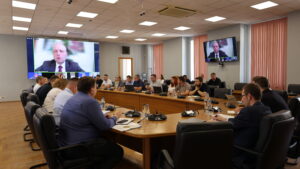Draft of Ukraine’s new Customs Code presented to EU experts
On 28 August, a meeting of the coordination team on the preparation of Ukraine’s new Customs Code took place, during which the draft was officially presented to experts of the European Commission.
“The draft of the new Customs Code of Ukraine, recently endorsed by the Government, has already been submitted to the European Commission for assessment. Developed on the basis of EU customs legislation, it is a cornerstone document for Ukraine’s European integration, for the European Union itself began with a Customs Union. Ukraine, situated at the heart of Europe, remains committed to the goal of EU accession and is taking all necessary steps towards it, despite ongoing attacks and shelling by the russian federation. In the current geopolitical context, we are well aware of the enormous potential of Ukraine’s customs service, above all in its role as Europe’s eastern customs frontier,” noted Yurii Draganchuk, Deputy Minister of Finance of Ukraine for European Integration.
He also expressed gratitude to the large team of drafters who had worked on the new Customs Code and voiced hope for continued effective cooperation in analyzing and refining the document, based on the European Commission’s assessment, as well as in subsequent consultations with the business community and the following stages — approval by the Government and adoption by the Verkhovna Rada.
It should be recalled that on 26 August, the Cabinet of Ministers, by protocol decision, endorsed the draft of the new Customs Code, which had been under development for nearly two years by specialists of the Ministry of Finance and the State Customs Service, in close cooperation with experts of EU technical assistance projects.
“The first and most difficult step has been completed—the draft of a fundamental document for the conduct of customs affairs in Ukraine, fully aligned with European standards, is now ready. We expect a positive conclusion from the European Commission and are already preparing for the next, equally important stages—public consultations on the draft Code and its submission to the Verkhovna Rada. In parallel, we will continue developing national IT solutions to ensure interoperability with relevant European systems. By the time Parliament is ready to adopt the Customs Code, its IT component must also be in place,” stated Vladyslav Suvorov, Deputy Head of the State Customs Service.
Adoption of the new Customs Code will not only complete the adaptation process but will also establish clear, transparent, and modern rules for Ukrainian exporters and importers, opening up new opportunities for trade with EU countries. The document will bring Ukrainian legislation into full alignment with that of the EU—an essential step for successful accession negotiations.
“We stand ready to continue providing all necessary support for the swift finalisation of the new Customs Code of Ukraine, based on the EU Customs Code. This includes ensuring the translation of the document into English, providing an expert assessment of the draft, and engaging European experts both to explain its functioning and to take part in discussions with the business community, as planned by the Ministry of Finance and the State Customs Service. This Code is the foundation for aligning the entire customs system of Ukraine with that of the EU. Without it, stable cooperation within the common European Customs Union would be impossible,” emphasized Vytenis Alisauskas, EU4PFM International Customs Expert.
At the meeting it was also stressed that the new Customs Code will not differ radically from the current one, since many EU-integration provisions had already been incorporated earlier. This was done to accelerate the integration of Ukraine’s customs system and to ease the transition for businesses to the new rules. These changes have been actively implemented and preliminarily discussed with business representatives during professional meetings and seminars.
“The Customs Code of Ukraine, based on the EU Customs Code, will create the legislative foundation for all customs IT systems that Ukraine must have in place by the time of EU accession. Our task is to develop and approve the entire package of secondary legislation, ensuring the continuity and effectiveness of customs procedures immediately upon the Code’s entry into force. In this process, we count on constructive cooperation with the business community,” underlined Oleksandr Moskalenko, Director of the Customs Policy Department of the Ministry of Finance.
The Ministry of Finance will establish a working group composed of representatives of civil associations, unions, and organizations engaged in protecting the rights and interests of business, to jointly advance the work following the European Commission’s assessment. The group will include up to 15 individuals who over the past three years have been actively contributing to improving the business environment in Ukraine.
Participants of the meeting reaffirmed their readiness to continue work on the draft of the new Customs Code and its secondary legislation—among them, experts of the Ministry of Finance, the State Customs Service, the RST under the Ministry of Finance, international experts of EU4PFM, as well as representatives of civil society. Information on the start of public discussions will be announced separately.

